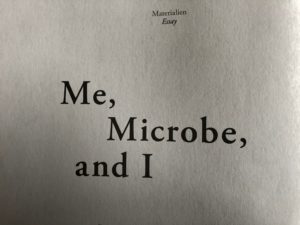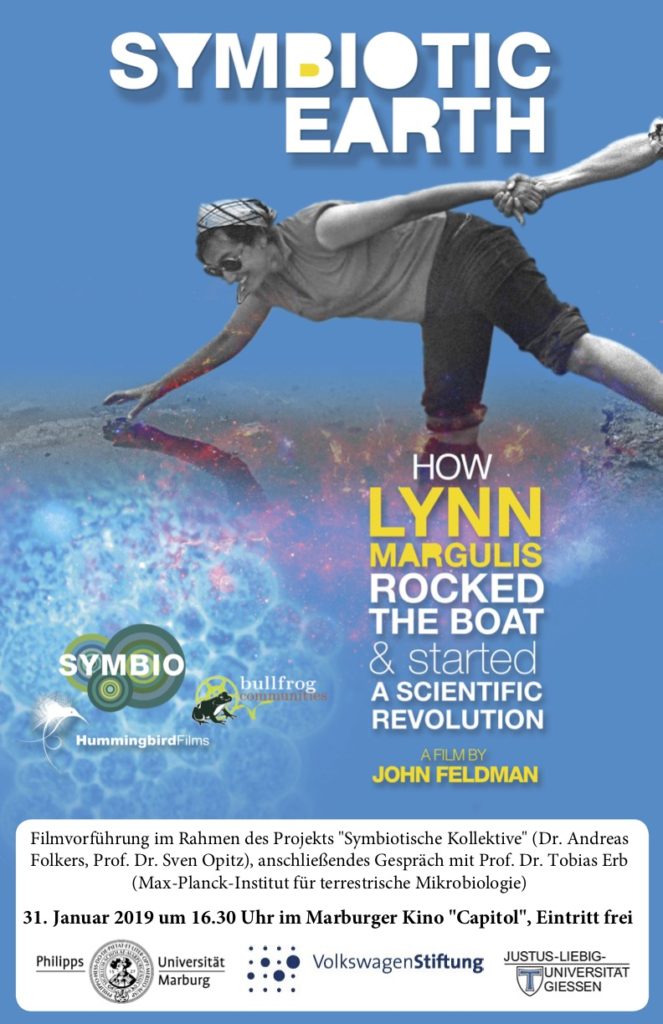Symbiotic Collectives examines the social and cultural implications of the symbiosis paradigm that has recently resurged in the life sciences due to the booming research on the microbiome. It asks how the manipulation of symbioses catalyses the emergence of bio-social relations. It focuses on two cases in which the biotechnological intervention in symbiotic relations between host animals and microbes addresses global problems: The modification of bovine ruminal bacteria seeks to reduce the methane production of global cattle populations. The creation of a symbiotic relationship between a bacterial species and a mosquito stops the latter from acting as a vector for infectious disease like dengue fever. The explorative case studies provide a particularly illuminating lens to study the emergence of a distinct mode of biopolitical intervention – symbiotic engineering – that creates novel relations between the living and the social on various spatial scales. By mapping these emerging symbiotic collectives, the project seeks to update concepts of sociality still prevailing in the humanities. The project mobilizes the concept of symbiosis to deepen our understanding of the hybridization of nature and culture. It therefore revisits the sociological use of the symbiosis concept by theorists like Robert E. Park and Niklas Luhmann and tries to arrive at a sociological understanding of symbiosis that takes into account the insights from millennial microbiology as well as the proliferation of symbiotic relations due to symbiotic engineering. The project thus combines explorative case studies with a theoretical concern: the analysis of symbiotic engineering with a theory of symbiotic collectives. >> read more
Recent Posts
Me, Microbe, and I
 An article we wrote for the Frankfurter Allgemeine Quarterly is now published in the 02/2020 issue of the Quarterly. In it we explore some of the socio-cultural implications of the hype around the microbiome. So we’ve written about good microbes, the pathologies of modern hygiene, and what we call symbiosociality. You might say that it is a pretty bad timing for the article to come out considering what is currently happening in the wake of the Covid-19 pandemic. Well, yes, modernist regimes of hygiene seem stronger than ever. But the good microbes will be back. In fact, they never left.
An article we wrote for the Frankfurter Allgemeine Quarterly is now published in the 02/2020 issue of the Quarterly. In it we explore some of the socio-cultural implications of the hype around the microbiome. So we’ve written about good microbes, the pathologies of modern hygiene, and what we call symbiosociality. You might say that it is a pretty bad timing for the article to come out considering what is currently happening in the wake of the Covid-19 pandemic. Well, yes, modernist regimes of hygiene seem stronger than ever. But the good microbes will be back. In fact, they never left.
Trees of Life Exhibition in Frankfurt
 The Frankfurter Kunstverein is presenting the exhibition „Trees of Life. Stories for a damaged planet“ which features a series of interesting works on microbes and symbiosis. In fact, the exhibition itself is a symbiosis of sorts between science and art. Institutionally, the exhibition is a collaboration between the Kunstverein and the Senkenberg Museum for Natural History curated by Franziska Nori from the Kunstverein and the geologist Philipe Havlik. The exhibition itself features a series of our most beloved social theorists like the inevitable Donna Haraway, Bruno Latour and Anna Tsing in addition to the Sym-biologists Lynn Margulis and Scott Gilbert whose ideas appear in video and in the texts. The exhibition even shows the Lynn Margulis documentary “Symbiotic Earth” by […]
The Frankfurter Kunstverein is presenting the exhibition „Trees of Life. Stories for a damaged planet“ which features a series of interesting works on microbes and symbiosis. In fact, the exhibition itself is a symbiosis of sorts between science and art. Institutionally, the exhibition is a collaboration between the Kunstverein and the Senkenberg Museum for Natural History curated by Franziska Nori from the Kunstverein and the geologist Philipe Havlik. The exhibition itself features a series of our most beloved social theorists like the inevitable Donna Haraway, Bruno Latour and Anna Tsing in addition to the Sym-biologists Lynn Margulis and Scott Gilbert whose ideas appear in video and in the texts. The exhibition even shows the Lynn Margulis documentary “Symbiotic Earth” by […]
Workshop “Symbiotische Kollektive” October 25.-26. in Marburg
 After our panels at the DGS-Kongress in Göttingen in 2018 and our panel at the 4s in New Orleans in 2019 we are happy to announce our first full Symbiosis-Workshop. In the workshop we will discuss with our panelists Symbiosis as a concept in and for sociological theory. What can symbiotic thinking offer for sociological theory and how can sociological theory help to think symbiotic collectives? For more information on the workshop check out our workshop flyer.
After our panels at the DGS-Kongress in Göttingen in 2018 and our panel at the 4s in New Orleans in 2019 we are happy to announce our first full Symbiosis-Workshop. In the workshop we will discuss with our panelists Symbiosis as a concept in and for sociological theory. What can symbiotic thinking offer for sociological theory and how can sociological theory help to think symbiotic collectives? For more information on the workshop check out our workshop flyer.
Symbiotic Collectives at 4s in NOLA
If you happen to be at the 4s in New Orleans this year, join us for our panel their. Here is some info on the panelists and their talks. We’re excited to discuss symbiosis at the 4s and look forward to meet you New Orleans!
Reciprocal Capture: Symbiosis as Object and Concept In STS-Research
Fri, September 6, 1:00 to 2:30pm, Sheraton New Orleans Hotel, Floor: Eight, Endymion
Research on the microbiome suggests that symbiosis is not just a curiosity but rather a rule in biology. Humans and non-human animals depend on symbiosis with microbes that outnumber their hosts in terms of cells and genetic material. Correspondingly, new modes of biotechnological intervention emerged trying to intervene into symbiotic relationships. This panel seeks to investigate scientific and technological practices associated with symbioses: How does […]
Stomaching Gaia: From the visual to the Visceral
 I recently re-read Latour’s “Facing Gaia” lectures. There would be a lot to say about this but one of the things that struck me was his reference to the “face” in the title. Why exactly do we have to “face” Gaia, why is the face and the visual still the angle from where to encounter issues of earthly, more-than-human politics? In a similar way Haraway also insists that it is our task to look the animal in the eye even though everyone who has a pet knows that there a host of different modes of recognition in the animal kingdom, most importantly: sniffing. The notion of “facing” Gaia also has the disadvantage that it more or less tacitly assumes that “we” and […]
I recently re-read Latour’s “Facing Gaia” lectures. There would be a lot to say about this but one of the things that struck me was his reference to the “face” in the title. Why exactly do we have to “face” Gaia, why is the face and the visual still the angle from where to encounter issues of earthly, more-than-human politics? In a similar way Haraway also insists that it is our task to look the animal in the eye even though everyone who has a pet knows that there a host of different modes of recognition in the animal kingdom, most importantly: sniffing. The notion of “facing” Gaia also has the disadvantage that it more or less tacitly assumes that “we” and […]
Symbiosis on Screen
 Last week we officially launched our research project with a screening of the film „Symbiotic Earth“ – a documentary on the life and work of biologist Lynn Margulis. The film is actually quite good (though it is a bit too long and the music starts to get annoying after two hours). It’s great to see Margulis think and talk. She is obviously not only a great writer and researcher but also a vivid and passionate speaker. The film engages with the political and social implications of different theories of evolution. That was very helpful for getting a sense of why symbiosis is not just an important object and figure of thought for biologists but also for social scientists.
Last week we officially launched our research project with a screening of the film „Symbiotic Earth“ – a documentary on the life and work of biologist Lynn Margulis. The film is actually quite good (though it is a bit too long and the music starts to get annoying after two hours). It’s great to see Margulis think and talk. She is obviously not only a great writer and researcher but also a vivid and passionate speaker. The film engages with the political and social implications of different theories of evolution. That was very helpful for getting a sense of why symbiosis is not just an important object and figure of thought for biologists but also for social scientists.
Still, we were […]
Filmscreening “Symbiotic Earth” 31.01.2019 in Marburg
 „Symbiotic Earth“ am Do, den 31.1. um 16.30 Uhr
„Symbiotic Earth“ am Do, den 31.1. um 16.30 Uhr
Ein Film über die Biologin Lynn Margulis, die unser Verständnis der Evolution und vom Ursprung allen Lebens revolutionierte. Erste Vorführung deutschlandweit! Anschließendes Gespräch mit Prof. Tobias Erb (Max-Planck-Institut), Dr. Andreas Folkers (Justus Liebig Universität) und Prof. Sven Opitz (Philipps Universität).
Symbiotic Collectives at the 4s-conference in New Orleans
We’re organinizing a panel on symbiosis as object and concept on the 2019 4s conference in New Orleans (see our call below). If you’re interessted you can apply here: https://www.4s2019.org/call-for-submissions/
Reciprocal Capture: Symbiosis As Object And Concept In STS-Research
Andreas Folkers, Justus Liebig-University Gießen
Sven Opitz, Philipps-University Marburg
Research on the microbiome suggests that symbiosis is not just a curiosity but rather a rule in biology. Humans and non-human animals depend on symbiosis with microbes that outnumber their hosts in terms of cells and genetic material. Correspondingly, new modes of biotechnological intervention emerged trying to intervene into symbiotic relationships. This panel seeks to investigate scientific and technological practices associated with symbioses: How does the turn toward mutualist arts of living challenge long-held assumptions in the life sciences, for instance about individualistic competition in […]
